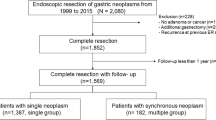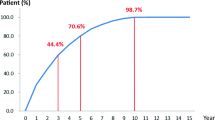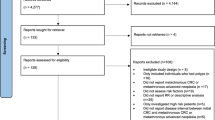Abstract
PURPOSE: The purpose of this study was to determine the risk factors for developing metachronous colorectal carcinoma and to determine an adequate postoperative colonoscopic surveillance. METHODS: Two hundred eighty-four patients, examined by routine colonoscopy after resection for colorectal carcinoma, were reviewed. Clinical and pathologic factors were assessed by multiple logistic regression analysis. RESULTS: One hundred eighty-three patients with synchronous adenoma or carcinoma at the initial operation had a significantly higher incidence of both metachronous adenoma and carcinoma than the 101 patients without a synchronous lesion. Other clinical factors including age, gender, tumor stage, tumor site, and tumor grade were not significant for an increased incidence of metachronous carcinoma. The presence of synchronous lesions proved to be the only risk factor (relative risk, 3.293;P=0.0155) for developing metachronous carcinoma. Metachronous carcinoma was detected in 30 patients (10.6 percent) and completely removed from all patients. Mucosal carcinoma was found in 25 patients (8.8 percent) and invasive carcinoma in 5 patients (1.8 percent). All five invasive carcinomas were detected in asymptomatic patients having synchronous lesion. Four patients required a second operation for metachronous carcinoma more than 13 months following the first. CONCLUSION: The risk factor for developing metachronous carcinoma is the presence of synchronous adenoma or carcinoma at the initial operation. To detect metachronous carcinoma at a curable stage, annual colonoscopic surveillance should be performed for highrisk patients.
Similar content being viewed by others
References
Kronborg O, Hage E, Deichgraeber E. The remaining colon after radical surgery for colorectal cancer: the first three years of a prospective study. Dis Colon Rectum 1983;26:172–6.
Cunliffe WJ, Hasleton PS, Tweedle DE, Schofield PF. Incidence of synchronous and metachronous colorectal carcinoma. Br J Surg 1984;71:941–3.
Carlsson G, Petrelli NJ, Nava H, Herrera L, Mittelman A. The value of colonoscopic surveillance after curative resection for colorectal cancer or synchronous adenomatous polyps. Arch Surg 1987;122:1261–3.
Muto T, Bussey HJ, Morson BC. The evolution of cancer of the colon and rectum. Cancer 1975;36:2251–70.
Atkin WS, Morson BC, Cuzick J. Long-term risk of colorectal cancer after excision of rectosigmoid adenomas. N Engl J Med 1992;326:658–62.
Winawer SJ, Zauber AG, Ho MN,et al. Prevention of colorectal cancer by colonoscopic polypectomy. N Engl J Med 1993;329:1977–81.
Meagher AP, Stuart M. Does colonoscopic polypectomy reduce the incidence of colorectal carcinoma? Aust N Z J Surg 1994;64:400–4.
Isbister WH. The follow-up of patients following surgery for colorectal cancer—a personal view. Ann Acad Med 1988;17:66–71.
Spigelman AD. Endoscopic surveillance for colorectal neoplasia. Br J Surg 1994;81:1664–5.
Patchett SE, Mulcahy HE, O'Donoghue DP. Colonoscopic surveillance after curative resection for colorectal cancer. Br J Surg 1993;80:1330–2.
Safi F, Link KH, Beger HG. Is follow-up of colorectal cancer patients worthwhile? Dis Colon Rectum 1993;36:636–44.
Barlow AP, Thompson MH. Colonoscopic follow-up after resection for colorectal cancer: a selective policy. Br J Surg 1993;80:781–4.
Ohlsson B, Breland U, Ekberg H, Graffner H, Tranberg K-G. Follow-up after curative surgery for colorectal carcinoma: randomized comparison with no follow-up. Dis Colon Rectum 1995;38:619–26.
Kelly CJ, Daly JM. Colorectal cancer: principles of postoperative follow-up. Cancer 1992;70:1397–408.
Cali RL, Pitsch RM, Thorson AG,et al. Cumulative incidence of metachronous colorectal cancer. Dis Colon Rectum 1993;36:388–93.
Lautenbach E, Forde KA, Neugut AI. Benefits of colonoscopic surveillance after curative resection of colorectal cancer. Ann Surg 1994;220:206–11.
Juhl G, Larson GM, Mullins R, Bond S, Polk HC Jr. Six-year results of annual colonoscopy after resection of colorectal cancer. World J Surg 1990;14:255–61.
Selby JV, Friedman GD, Quesenbeny CP Jr, Weiss NS. A case-control study of screening sigmoidoscopy and mortality from colorectal cancer. N Engl J Med 1992;326:653–7.
Eckardt VF, Stamm H, Kanzler G, Bernhard G. Improved survival after colorectal cancer in patients complying with a postoperative endoscopic surveillance program. Endoscopy 1994;26:523–7.
Kashima Y, Takii Y, Okamoto H,et al. Follow-up colonoscopy after resection of colorectal cancer. J Jpn Soc Coloproctol 1991;44:193–7.
Kiefer PJ, Thorson AG, Christensen MA. Metachronous colorectal cancer: time interval to presentation of a metachronous cancer. Dis Colon Rectum 1986;29:378–82.
Barkin JS, Cohen ME, Flaxman M,et al. Value of a routine follow-up endoscopy program for the detection of recurrent colorectal carcinoma. Am J Gastroenterol 1988;88:1355–60.
Evers BM, Mullins RJ, Matthews TH, Broghamer WL, Polk HC Jr. Multiple adenocarcinomas of the colon and rectum: an analysis of incidences and current trends. Dis Colon Rectum 1988;31:518–22.
Granqvist S, Karlsson T. Postoperative follow-up of patients with colorectal carcinoma by colonoscopy. Eur J Surg 1992;158:307–12.
Winawer SJ. Follow-up after polypectomy. World J Surg 1991;15:25–8.
Blackstone MO. Colorectal adenomas on follow-up colonoscopy: is the cancer risk unchanged? Lancet 1995;345:1126–7.
Olsen HW, Lawrence WA, Snook CW, Mutch WM. Review of recurrent polyps and cancer in 500 patients with initial colonoscopy for polyps. Dis Colon Rectum 1988;31:222–7.
Chen F, Stuart M. Colonoscopic follow-up of colorectal carcinoma. Dis Colon Rectum 1994;37:568–72.
Winawer SJ, Zauber AG, O'Brien MJ,et al. Randomized comparison of surveillance intervals after colonoscopic removal of newly diagnosed adenomatous polyps. N Engl J Med 1993;328:901–6.
Beck DE, Opelka FG, Hicks TC, Timmcke AE, Khoury DA, Gathright JB Jr. Colonoscopic follow-up of adenomas and colorectal cancer. South Med J 1995;88:567–70.
Brady PG, Straker RJ, Goldschmid S. Surveillance colonoscopy after resection for colon carcinoma. South Med J 1990;83:765–8.
Schraibman IG. Endoscopic surveillance for colorectal neoplasia. Br J Surg 1995;82:568.
Rex DK. Colonoscopy: a review of its yield for cancers and adenomas by indication. Am J Gastroenterol 1995;90:353–65.
Collopy BT. The follow-up of patients after resection for large bowel cancer, May 1992. Med J Aust 1992;157:633–4.
Author information
Authors and Affiliations
Additional information
Read at the meeting of the Japanese Society of Gastroenterological Surgery, Osaka, Japan, February 22 to 23, 1996.
About this article
Cite this article
Yamazaki, T., Takii, Y., Okamoto, H. et al. What is the risk factor for metachronous colorectal carcinoma?. Dis Colon Rectum 40, 935–938 (1997). https://doi.org/10.1007/BF02051201
Issue Date:
DOI: https://doi.org/10.1007/BF02051201




